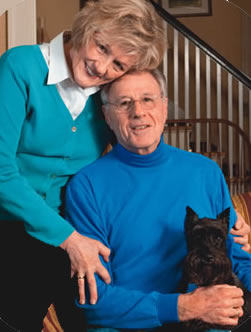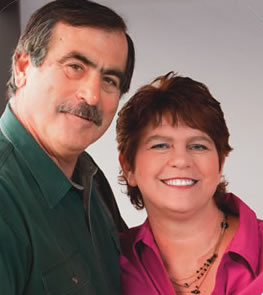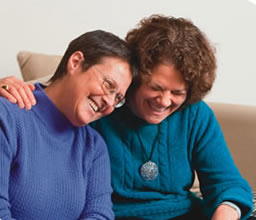Focusing on the Caregiver

Sixteen years ago, Mark Bernhard was diagnosed with colorectal cancer. Five years later, he survived prostate cancer. By the time the colorectal cancer reappeared in spring 2007 and spread to his lungs, Mark and Pauline Reisner, his wife of 30 years, knew they could handle whatever came along.
And so, when Bernhard and Reisner were invited to participate in a University of Michigan Rogel Cancer Center study measuring the impact of various interventions on quality of life for both cancer patients and caregivers, they said yes. As part of the study, a nurse met with the couple to talk about how they were coping and to provide them with information and support.
"I really appreciated the support and the focus on the caregiver," Pauline said. "I looked forward to the visits. It's not that I had desperate feelings. I knew I had support, but it was about being able to talk about where we are. "Without this, I probably wouldn't have recognized the need to talk or gone about finding resources on my own."
As cancer invades the body, it breaches the boundaries of relationships, too. Husbands, wives, partners, mothers, fathers, brothers, sisters and friends take on the unfamiliar role of caregiver -- and with it, a tremendous bundle of responsibility and emotion. Consider first:
Caregivers may be anxious about the care they need to provide. Tensions may arise as patients interpret caring gestures as overbearing. Top that with the burden of taking charge of day-to-day affairs like paying the bills, keeping up the house and maintaining their own jobs. And don't forget the underlying fear of losing a loved one to cancer.
Although cancer care focuses almost solely on patients, a growing body of research is documenting the impact of cancer on caregivers. Studies have shown that people who care for loved ones with cancer suffer as much emotional distress as the patients themselves. And yet there are far fewer resources tailored to caregivers' needs.
Family involvement: Patients and caregivers are encouraged to work as a team to manage the illness. This includes supporting one another and maintaining open communication about the illness.
Optimistic outlook: Families are advised to set short-term goals they can reach, to concentrate on what's going well and to stay hopeful.
Coping: Caregivers are provided with tools to help them cope with cancer directly, rather than pretending it's not an issue. Nurses promote active, healthy lifestyles while stressing how important it is for caregivers to take care of their own well-being-physically and emotionally.
Uncertainty reduction: Nurses help families get the information they need to reduce the uncertainty that comes with a cancer diagnosis-and they help families find strategies for coping with questions that have no answers.
Symptom management: In some cases, addressing symptoms related to cancer treatment may bring to light issues that caregivers are having. For example, when addressing male sexual dysfunction after treatment for prostate cancer, nurses will encourage female partners to address their own sexual health concerns that may be related to menopause.
That's why Laurel Northouse, Ph.D., R.N., co-director of the Rogel Cancer Center's Socio-Behavioral Research program, and her colleagues designed the study in which Bernhard and Reisner participated.
"Caregivers are often viewed as support persons to patients and seldom as care recipients," Northouse said. "Most people are not prepared for becoming a caregiver, and this lack of preparation can have a negative effect on them. We now have a better understanding of the caregivers' experience. The next step is to determine the best ways to provide this care not just to patients, but to their caregivers as well."
At the core of Northouse's work are five components identified in earlier research that seem to help people fare better in the face of a cancer diagnosis. The goal of the FOCUS studies -- named from the acronym of each of the components -- is to encourage families to develop these healthy behaviors in order to handle the demands of the illness.
As part of the trial, nurses with advanced degrees met with caregivers and patients in their homes to discuss ways to work as a team to manage the illness; to develop a more optimistic outlook; to find ways to cope with cancer directly, rather than by pretending it isn't an issue; to reduce the uncertainty that comes with a cancer diagnosis; and to manage symptoms -- both for the patient and for the caregiver.
Northouse and her colleagues have conducted three FOCUS studies involving breast, prostate, lung and colorectal cancer patients. Although results of the latest study are still pending, earlier studies with breast and prostate cancer patients have been promising.
In an article published in the journal Cancer, Northouse reported that after four months of the program, caregivers for spouses with prostate cancer reported higher quality of life and more confidence in their ability to provide care; better communication with their partners; less negative appraisal of the caregiving experience; and less uncertainty, hopelessness and symptom distress than caregivers who did not receive the intervention. Patients also reported less uncertainty and better communication after four months, as compared with those who did not receive the intervention. Some effects were sustained up to a year later.

For Kate and Nick Ebli, participating in the FOCUS program led to a revelation that Kate hadn't expected. Kate was originally diagnosed with breast cancer in 2004; last year, doctors found that it had returned and spread to her lungs and liver. During one of the FOCUS sessions, the couple was asked to talk about what they most feared.
"I thought his response would be losing me, but his response was not being in a position to help me -- being somehow helpless to attack this dragon," said Kate, a state representative from Monroe County. "I hadn't thought about that."
"It's just very hard for me to walk away from something without fixing it," said Nick, a retiree and Marine Corps veteran who served in Vietnam.
"We've been married for a very long time, we have a great relationship with each other, we have wonderful support from family and friends, but it was helpful to acknowledge that there are some things you just don't want to talk about," Kate said. "You just want to go about living life and enjoying life, but when circumstances are such that you have to deal with cancer, I found it helpful to have someone else there to help us talk about it. And I didn't think we were the people who needed that."
Given the state of the economy in Michigan, caregiver needs may continue to grow. A 2009 survey conducted by the National Alliance for Caregiving and Evercare indicated that half of caregiver respondents reported that, as a result of the economic downturn, they experienced increased stress about being able to care for loved ones.
Northouse and her colleagues are looking for ways to develop more cost-effective interventions for families. Some of the ideas they are pursuing are training nurses with bachelor's, rather than master's degrees, to deliver the intervention; developing Web-based tools to accomplish the same goals; and collaborating with The Wellness Community to pilot the program using small groups of patients and caregivers.

The Wellness Community initiative -- which will be tested by the Ann Arbor chapter -- is funded by a $100,000 grant from the Rosalynn Carter Institute for Caregiving.
"It's certainly less costly to deliver the intervention to a group," Northouse said. "And we may find that there's more synergy in small groups of couples meeting regularly. We may discover added benefits with this model."
Another future goal for the FOCUS program is to better understand whether gender plays a role in how caregivers cope. The latest study, which involves lung and colorectal cancer patients, may help to shed light on that question, she said.
Although most who have participated in the studies have been married or committed couples, other types of caregivers have been represented as well. Ann and Didi Robins, two sisters, participated in the latest study.
Ann, who has been fighting metastatic colon cancer since 2001, moved to Ann Arbor from New York City two years ago to be closer to her sister. The sisters live across the street from one another.
"We have our independence," Ann said.
"But in the first six weeks, we almost killed each other," Didi said.
The sisters have dinner together almost every night. Didi said she makes time, despite the hectic pace of her work as a professor of human genetics at the U-M Medical School.
And on weekends, the Robinses head to Ann's basement to work on decorative wall hangings that they're constructing from discounted Motawi tiles.
 Keep the communication open. It's helpful for patients and caregivers to talk through their emotions with one another. Often, people take it for granted that they know what other people are thinking or feeling. Even if you know another person intimately, you may be surprised to learn how he or she feels.
Keep the communication open. It's helpful for patients and caregivers to talk through their emotions with one another. Often, people take it for granted that they know what other people are thinking or feeling. Even if you know another person intimately, you may be surprised to learn how he or she feels.
 But share responsibly. You don't have to talk about everything you're feeling. Dumping feelings on one another can lead to more stress.
But share responsibly. You don't have to talk about everything you're feeling. Dumping feelings on one another can lead to more stress.
 Set aside longstanding conflicts. Now is not the time to settle old fights. Save your energy to deal with the cancer. Begin to accept that the only certainty is uncertainty. Coping with uncertainty is key. It may not be pleasant, but try to remember that uncertainty is part of life -- with or without cancer.
Set aside longstanding conflicts. Now is not the time to settle old fights. Save your energy to deal with the cancer. Begin to accept that the only certainty is uncertainty. Coping with uncertainty is key. It may not be pleasant, but try to remember that uncertainty is part of life -- with or without cancer.
 Re-prioritize. Consider what's most important to you now and let other obligations fall by the wayside. Learn to say no.
Re-prioritize. Consider what's most important to you now and let other obligations fall by the wayside. Learn to say no.
 Maintain a healthy lifestyle. This is important for caregivers and patients-both physically and emotionally. Caregivers, don't ignore or delay treatment for your own health problems. Exercise can help relieve stress, so take time to go to the gym or for a walk in the park. The healthier you are, the better caregiver you will be.
Maintain a healthy lifestyle. This is important for caregivers and patients-both physically and emotionally. Caregivers, don't ignore or delay treatment for your own health problems. Exercise can help relieve stress, so take time to go to the gym or for a walk in the park. The healthier you are, the better caregiver you will be.
![]() Allow each other space. It's good to spend time with other people, too. Caregivers, in particular, often feel too guilty to leave the house. Take time to recharge emotionally by spending a night out with friends.
Allow each other space. It's good to spend time with other people, too. Caregivers, in particular, often feel too guilty to leave the house. Take time to recharge emotionally by spending a night out with friends.
 >Let cancer recede into the background. Take time for enjoyable distractions. Try not to let your worries consume your life.
>Let cancer recede into the background. Take time for enjoyable distractions. Try not to let your worries consume your life.
 Ask for help. Many of the tips offered here are challenging. Consider seeking out professional counseling to help you work through this.
Ask for help. Many of the tips offered here are challenging. Consider seeking out professional counseling to help you work through this.
Although Ann and Didi are close -- and close in age as well with only 15 months between them -- the things that are emotionally difficult for each of them are very different. They said the FOCUS program helped them to talk about those things.
"I would begin, but I couldn't open my mouth to say it: What do you want to be done afterward? Do you want to be buried or cremated?" Didi said.
"I don't find that hard at all," Ann said.
"But it was hard for me to say. I'm this hard-as-rock, butter-wouldn't-melt-in-my-mouth scientist person, and there are things that just the mere thought of them brings tears to my eyes," Didi said. "Ann's always been the warmer, cuddlier one."
"It's very hard for both of us," Ann said.
"We're very close, and I can't bear the thought of my sister being alone. It's really hard for her to think about me not being here."
"She's known me my entire life since childhood," Didi said. "She knows how we got to be the way we are, for better or worse."
"You don't get to choose your sisters the way you choose spouses," Ann said. "You get the good side and the bad side."
"Spouses can remarry, but I'm not going to get another sister," Didi said.
Talking about cancer and death isn't easy. But Northouse said her research suggests that people who are able to cope with it directly -- rather than through avoidance -- fare much better emotionally. Often, people try to protect one another by not talking about their fears and sadness.
"People put a lot of energy into not talking about it," Northouse said. "Caregivers don't want to upset patients or put an extra burden on them. But it's really hard to support one another when you don't know what the other is feeling."
All the families Thrive interviewed agreed that talking through their situation with a nurse helped them to feel more comfortable. For Bernhard and Reisner, it was reassuring, too.
"It helped us to focus on the really positive things we have going for us," Pauline said. "It also made us think about how fortunate we were that we had a strong relationship and we could be supportive of each other.
"It really makes you realize how much teamwork is involved."
Read the Winter, 2010 issue of Thrive.
